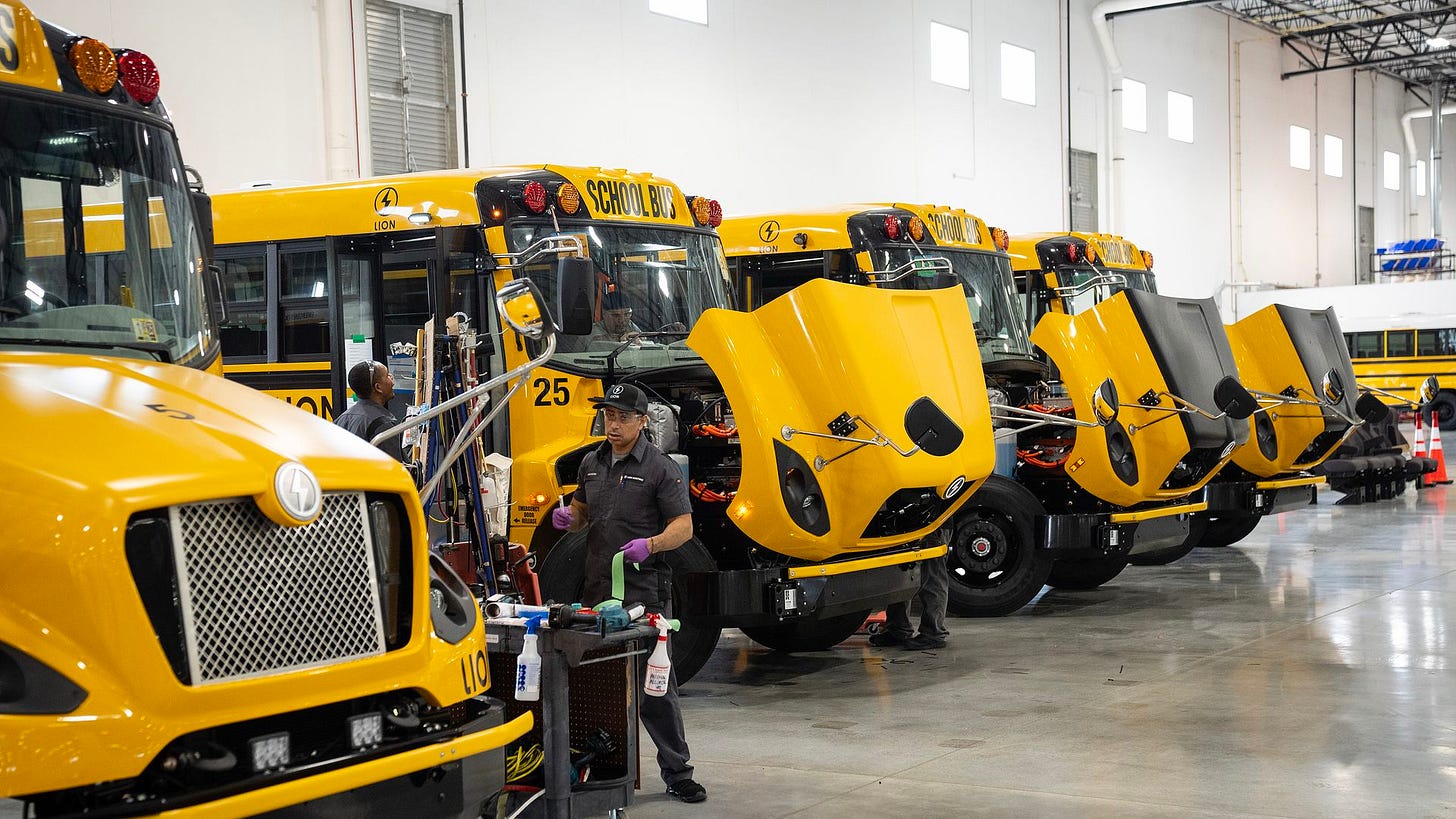HEADLINE: “Clean school bus transition gets clogged up”
“As students head back to school, a five-year effort to replace diesel school buseswith electric ones has hit two big speed bumps: a federal funding freeze, plus collapse of leading bus manufacturer…”
Clean school bus transition gets clogged up

As students head back to school, a five-year effort to replace diesel school buseswith electric ones has hit two big speed bumps: a federal funding freeze, plus the collapse of a leading bus manufacturer.
Why it matters: There's still lots of enthusiasm for cleaner buses, advocates say, but some school districts are turning back to diesel because they didn't get the electric buses they were promised or can't get service on the ones they own.
Catch up quick: Canadian electric bus maker Lion Electric filed for bankruptcy in December 2024 and shut down its only U.S. factory in Illinois.
The new owners, a group of Quebec-based investors that took control in May, reportedly said they won't honor U.S. orders or warranties.
Alarmed school districts that used taxpayer funds to buy Lion buses are left wondering about the status of pending orders, and about who will service buses already on the road.
Zoom out: The Trump administration hasn't said what will happen to the $2.3 billion in unspent funds in the EPA's $5 billion Clean School Bus program, created under 2021's bipartisan infrastructure law.
About $2.7 billion was disbursed across three rounds of funding in 2022 and 2023, during the Biden administration.
Applications for a fourth round of $965 million, announced in September 2024, closed in January, just before Trump took office, but no awards have been made.
As one of his first acts, Trump issued an executive order rolling back funding for clean energy and electric vehicles.
That prompted an EPA review of the Clean School Bus program. The agency expects to provide an update soon on whether more awards will occur, an EPA spokesperson tells Axios.
Zoom in: Congress also killed another Biden-era program that helped school districts offset the cost of electric buses.
The Commercial Clean Vehicle Tax Credit, approved under the 2022 Inflation Reduction Act, provided up to $40,000 for the purchase of electric commercial vehicles, including school buses.
It was axed, along with other tax credits for EV purchases, in this year's massive budget reconciliation bill.
Where it stands: There are nearly 14,000 committed electric school buses in the U.S. — meaning they're funded, ordered or delivered — including 5,300 already on the road.
Electric school buses have been deployed in 49 states, the District of Columbia, four U.S. territories and more than 20 tribal nations, according to data from WRI's Electric School Bus Initiative.
Yes, but: That momentum died in 2025, with 13,931 committed e-buses, only 73 more than in 2024.
What to watch: Increasingly, state and local funding programs are helping to drive the electric school bus transition forward.
Cumulative state-level funding grew dramatically from $268 million in 2020 to $2.47 billion in 2025.
"We're going to need some amount of incentives to keep moving forward," acknowledges Sue Gander, who leads a program at World Resources Institute to support school districts' purchases of electric school buses.
"The economic benefits and health benefits are still there," she said. "Those are the reasons school districts want to move forward".
The bottom line: Nearly half a million school buses carry more than 20 million children each day in the U.S., and about 90% run on diesel fuel, which has been linked to serious health risks and development issues in children.
New research from the World Resources Institute's Electric School Bus Initiative shows that the U.S. would see an estimated $1.6 billion in societal benefits annually by switching to electric.


I seriously doubt spending millions of dollars on electric school buses is going to do anything at all to improve children’s health and learning abilities. I would instead think the purported goals of these fossil fuel haters would be better accomplished by more respect for the decisions of parents to buy the best product for their child’s education.